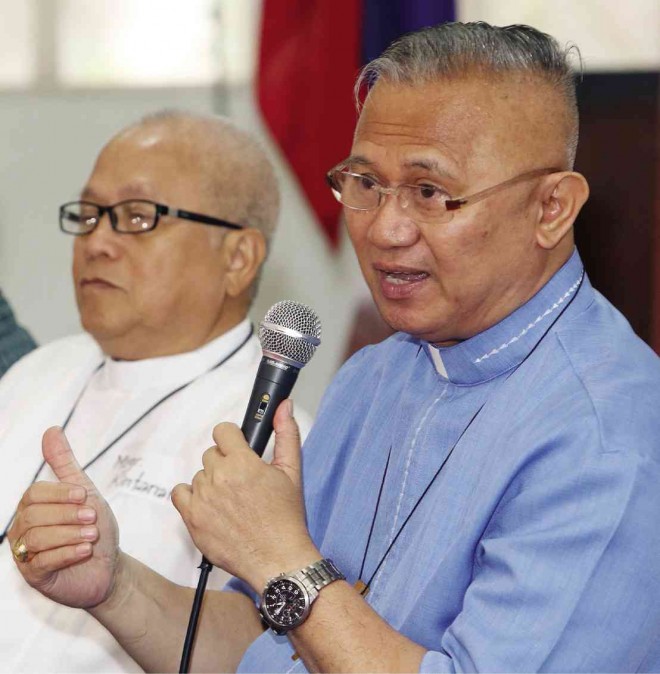Church laments absence of Mideast Christians in Cebu confab
CEBU CITY—Even ahead of the opening of the 51st International Eucharistic Congress (IEC) here on Sunday with thousands of delegates from 70 countries expected to attend, Catholic Church leaders are lamenting the absence of Christians from the Middle East as a result of the Christian persecutions there by the Islamic State of Iraq and Syria (IS).
“The Eucharist is supposed to be open to all,” said Cebu Archbishop Jose S. Palma, president of the IEC. “But there are Christians from the predominantly Muslim countries where it is not easy to celebrate the Mass. They also hunger for God.”
Worse, Palma said Christians are being persecuted and even killed in those countries.
“The Lord knows the longings of people and the longing itself is meritorious. We express our solidarity with them through our prayers. May they fulfill their longing to be united with the Lord,” he said.
Palma made these remarks during a press conference at Cebu Doctors University where the 51st IEC Theological Symposium was being held in the run-up to the congress.
Article continues after this advertisementTouching talk
Article continues after this advertisementThe symposium opened with a touching talk by British Dominican friar and best-selling author Fr. Timothy Radcliffe, recently appointed by Pope Francis to the Pontifical Commission on Justice and Peace.
Radcliffe, a former master general of the Dominicans, the medieval Catholic religious order that is one of the most influential Christian missionary forces in history, said he had visited the Christian communities in the troubled Middle East and found their situation “desperate”.
Despite their grim future, Christians have chosen to stay there, he said.
“In the face of this global desperation, how can we share our Christian hope?” Radcliffe asked.
“Our brothers and sisters in Iraq can teach us. First of all, they express their hope by remaining in Iraq. Simply staying is a sign of hope in the Lord who has promised to be with us until the end of time,” he said.
He said Christians in IS-persecuted territories “express their hope by praying.”
“Above all they celebrate the Eucharist. In the middle of war-torn Baghdad and the desolate refugee camps of Kurdistan, they gather to remember what Jesus did on the night before he died,” Radcliffe said.
Pope Francis has described the massacre of Christians by the IS as a “testimony that cries out” and that everyone is a brother or sister in the Christian faith, regardless of denomination or church.
But Christians are persecuted not only in Asia Minor, where the first Christian communities grew during the apostolic era. They are also persecuted elsewhere, IEC leaders said.
Travel ban
During the press conference, Palma said some nationals of “communist” countries were denied permission to travel, apparently referring to China where religions and sects are state-controlled and where the Catholic Church was banned.
But some Chinese Christians from Hong Kong and Macau are joining the congress, IEC leaders said. Although Hong Kong and Macau have reverted to Chinese rule, they are “special administrative regions” that are accorded autonomy by China.
In fact, Cardinal Joseph Zen, the retired archbishop of Hong Kong, and Macau Bishop Stephen Lee are attending the congress.
Cardinal Zen, an 84-year-old Salesian priest, is a vocal critic of China’s communist government, and has called for Hong Kong to be given full democracy.
Pope Francis himself has appointed as papal legate an Asian prelate, Cardinal Charles Maung Bo, SDB, of Rangoon (Yangon), Burma (Myanmar), which has only recently been moving out of long decades of a socialist military dictatorship.
Cardinal Bo will officially open on behalf of Pope Francis the IEC on Sunday with a Mass at Plaza Independencia at 4 p.m.
At least 12,000 have already registered for the congress, said Cebu Auxiliary Bishop Dennis Villarojo, the head of the 51st IEC organizing committee.
Some of them are already in Cebu attending the IEC Theological Symposium, which runs till Friday (Jan. 22).
The IEC began holding an international congress every four years in the late 19th century. Its focus is on the Holy Eucharist, which refers both to the liturgical celebration as well as the “sacrament of communion.”
